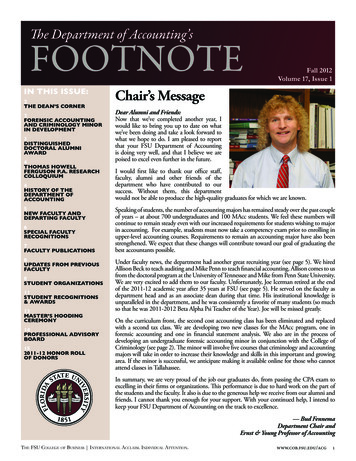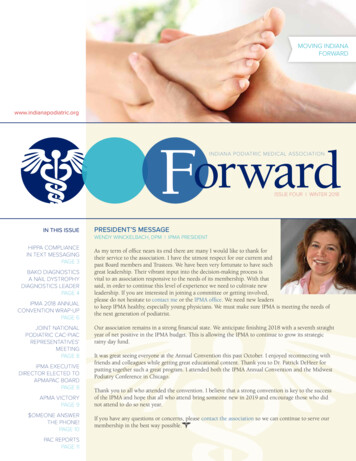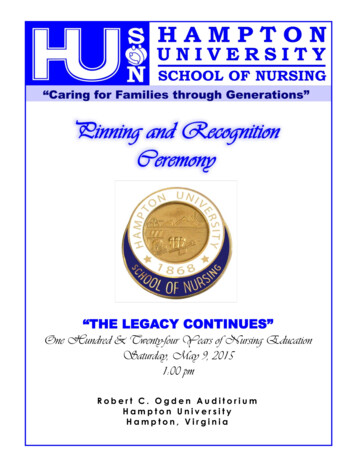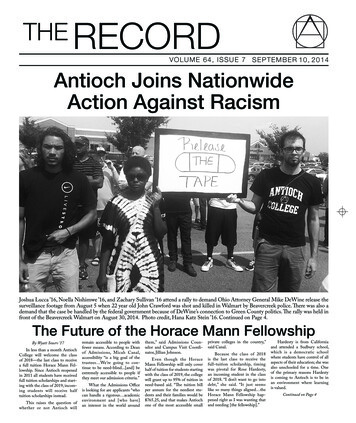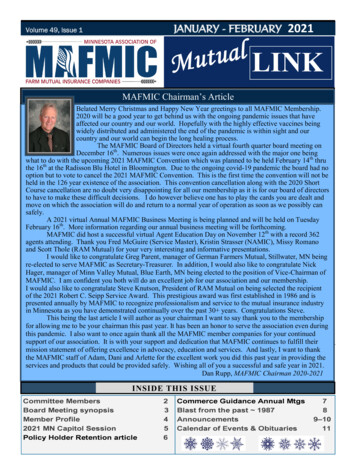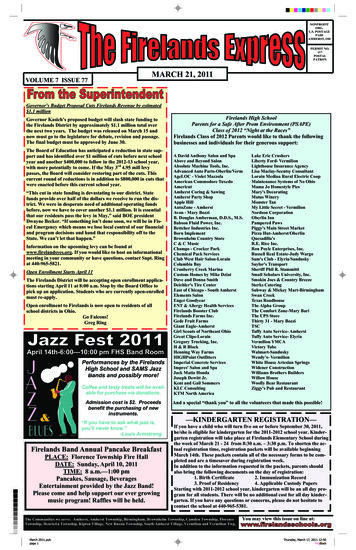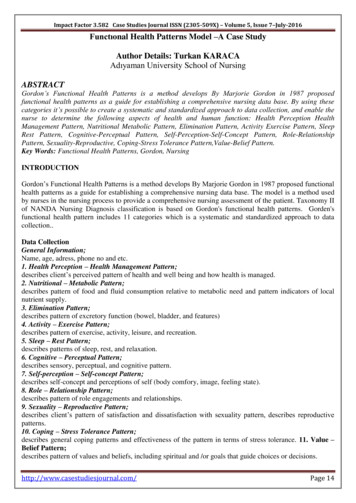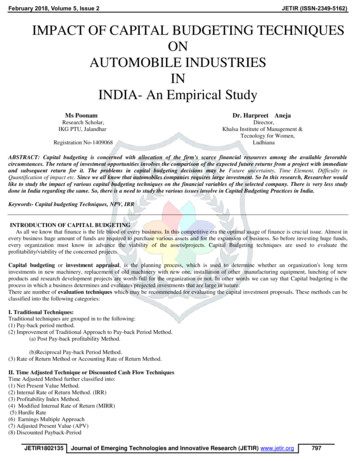
Transcription
Volume Four, Issue One
baby eat booksFOUNDING EDITORS: Jason Teal, Nathan FloomPOETRY EDITORS: Ally Harris, Chas HoppeHEAVY FEATHER REVIEW is published biannually by Baby Eat Books, heavyfeatherreview.com.SUBSCRIPTIONS: Online at heavyfeatherreview.com via Paypal. Subscriptions automaticallyrenew at the end of each period, and can be cancelled by going to the Subscription Details page.Print subcription (two issues): 20.00 domestic (US); 40.00 international. Digital subscription(two issues): 5.00. For information about subscriptions and advertising, email the editors atheavyfeatherreview@gmail.com.Submissions are accepted electronically via Submittable. Inquiries and queries can be sent tothe editors at heavyfeatherreview@gmail.com. Simultaneous submissions are allowed. Pleasereview our guidelines before submitting: heavyfeatherreview.com/submit.Bookmark heavyfeatherreview.com. The homepage is updated on a rolling basis. Follow us onFacebook, Twitter, Goodreads, and Tumblr.Copyright 2015 by authors. All rights reserved.ISSNsPrint: 2373-3519Online: 2373-3527Featured Freakers illustrations by Kevin Hooyman. Used with permission.Book designed by Jason Teal.Many thanks to the following people, places, and organizations: our contributors, families,friends, and readers.
CONTENTSF Daniel Rzicznek, Hatchet”002Thea Brown, Two Poems003Adrian Van Young, “Ruidoso, Carrizozo, Ruidoso”007Jim Daniels, “Boo Boo”026Joe Lucido, Three Fictions029Ted Pelton, “The Sloth Girl”035Taryn Andrews, “For Someone”037Chelsea Laine Wells, “Breakable”039Knar Gavin, Two Poems045Bridget Talone,“A Dream Is a Witch Your Heart Makes, (Music for Shame)”048Alexis Almeida, “On Trains”050Contributors053
Dear Reader—“After December comes January. Do not detox or sign up for a gymnasium.January is dark and boring, you must drink, create, dream, and read,” tweetedSalena Godden, @salenagodden, author of Springfield Road (Unbound). PoetryEditor Ally Harris, in addition to cultivating featured essays for the blog, hastaken over Twitter, @HeavyFeatherRev, where she recently re-tweeted Goddenduring 4.1’s formation. The timing could not have been more perfect.For this issue,we have retained the original vision of publishing challengingand dynamic works from writers we love, as well as designing a literaryjournal that can be seen and held as an art object, thanks to the talenteddesign skills of Jason Teal and artists from around the world. We welcomeback contributors F. Daniel Rzicznek, Phillip Gregory Spotswood, ChelseaLaine Wells, Colin Winnette, and Ace Boggess, and say hi to Jim Daniels, SaraLippmann, Bridget Talone, Adrian Van Young, and Knar Gavin, among others.Likewise, we welcome Chas Hoppe, Poetry Editor, to our masthead. He bringsyears of experience in poetry writing and freelance writing to bolster futureblog and issue content.Furthermore, we’d like to thank all who contributed to our poetrychapbook contest and give special mention to the finalists: Lauren Gordon,Marco Maisto, Caitlin Scarano, Partridge Boswell, and Jacqueline WinterThomas. Join us in congratulating winner Flower Conroy and Facts about Snakes& Hearts. Judge Kristina Marie Darling, author of The Arctic Circle (BlazeVOX),said the manuscript “ offers us poems that are as sure of their singularvoice as they are diverse in style and metaphor” and “ skillfully situates theage-old tradition of the love lyric in a postmodern literary landscape.” We’rethrilled to publish the collection. Conroy joins past winners Colin Winnette(Follow Through, selected by Lucy Corin and published in 3.3), Ryder Collins (Theway the sky was now, selected by Amber Sparks and published in 3.1), and JimRedmond (Shirts or Skins, selected by Noah Eli Gordon and published in 3.2).Be sure to visit heavyfeatherreview.com to read new, original essays asthey are published. And while you’re there check out the “swag” page whereyou can purchase art tees designed by past contributors Scott Teplin and JonRead. A note: our fiction chapbook contest judged by Jac Jemc, author of ADifferent Bed Every Time (Dzanc Books), is quickly drawing to a close. Submit!All submissions come with a year-long digital subscription to the journal.Jason, Ally, Chas, and I hope that this issue finds you well as winter fadesand spring struggles to find us. Above all, keep thinking, keep writing, and asGodden said, “drink, create, dream, and read.”—Nathan FloomFounding Editor
F. Daniel RzicznekHATCHETCame down from the hills to findthe thaw refrozen, ground even harderthan before, and this in late March:twist of smoke to the south,early star or two riding the blue.The half-tame one, chest-deep in snow,looked back at me, his face tilting asmemories pooled in my head:the time he stole a deer femur,huffing and growling, refusing to drop,then a week of whining until the shardpassed. Was there something I keptmissing? I had never taunted him.He never turned from me in disgust,and dogs do register disgust—they are choosier than humans, choosierthan God, their comings and goingsfull of both pattern and chance,doing the same things but never twice.When we slept before the fire, one of usalways reinvented the lost relicburied beneath the horizon of crows,but never both of us at once.2
Thea BrownASPENWhat stirs amidst this stagnancy. The state is onfire because you said it so. Up to the mountains,craggy in the right ways to startle ambivalence intoloss of wonder, of pressing on toward the backfirepopping once. A grouse, less fancy than dun, chidingas the Captain doffs his hat, pays his entrance feeto photograph the most photographed vista, bratspulling grass, pissing, throwing stones wherever.Half an hour rewinds the watch, ticks thermometer,fourteen degrees hotter in the sun doesn’t dent theafterburn or the local violence reports. If only moreviolence dressed up like unspeaking evil, dresseddumb despite. The house with a telescope roof, golddomed. The Captain eats with a sabre while youwatch and I watch and we wait for parting lids topresent the scope into the sky, or at least the spaceabove the houseat the base of the mountains littered with lifts tocarry the watching higher and thinner withouteffort. You lie to me about what you see I severyour tendons to suture back when the time isright. Facts keep the laziest of us happy. Facts likewatching breaks into spirals, dust-like in enormity.My everyday is too much as it is. I see nothing in aspeck of dust. All of it—the Captain’s glamorous hair,his timepiece,his lightning strike, the bottom of your well, myfinery in the face of the unknown or the most-seenmountain on the Internet. If someone else takes thepicture does it lose its power to regenerate, overtakememory over time? If the not-taking’s erased?Couples take their turns at the scope, up the lift, seethe fire? It’s a zillion tiny fires! Decadent, yes, but3
Thea Brownthere’s no other way. Ashing on you ashing on,descendent portal breathes a dirty thought asthe telescope retracts, huffing. Your escapism isworthless, all dressed up. Welcome what you findback to your home. Everything burns on.4
Thea BrownPROXYCalendrical reversals, all calamity aside. Allmurder as drama: product callous, productcalculated. World clock halts, tacks forwardtwo, reverses one, settles. All eyes ice. Alllistening, rounded. Blackbirds, listening. Alleyes twice, closing and was the passing quietat least, like peeling transparency from ascreen, bulb still bright. Blackbirds on wiresign nothing, no pulse; grounded no mindthrough cable, no candle left burning, melttapping slow inhale, no static just cutouts:policeman, fireman, medic. Hillside tinder ablip. Was the passing what finally held you incalm or resignation and worry forgotten. Toforget to be frightened, a last lost.5
Adrian Van YoungRUIDOSO, CARRIZOZO, RUIDOSOBilly Sue Dolan was from Ruidoso, one town in a hundred New Mexico towns.Except Ruidoso was in Lincoln County, the most violent part of thatdesolate state, where William McCarty or William H. Bonney or Billy the Kid,he would come to be known for the twenty-one men he’d reportedly slain, hadseen ideal to make a home. Whether Billy, however, was from Ruidoso or elseCarrizozo, another small town, was among Billy-experts a cause for debate.Lincoln was the certainty. In Ruidoso’s bleak downtown, with its Family Dollarand Tex-Mex cafe and insolvent state bank where drip coffee was served, BillySue’s father, Lester Dolan, owned the Six-Gun Museum devoted to Billy. Whilelooking north to Carrizozo, in an equally bleak and insolvent downtown, wasa second museum devoted to Billy, the William H. Bonney Historical Centerand this one run by Wyatt Turnstall, a man that Sue’s father detested in full.It had been, to both of their knowledge, an upset: something in the LincolnWar.Dolan’s kinfolk had killed dozens of Turnstall’s. Or Turnstall’s kin hadmurdered Dolan’s. But where Dolan’s outfit was crisply maintained, withits wall-text displays and objects in vitrines, the other one (Turnstall’s) hadfallen to ruin, more a curio house than a proper museum. Yet people drivingthrough the state, punchy with scrub-brush and gas station soda, would skipover Dolan’s in favor of Turnstall’s.It was the way of things those days.Sue’s mother had died on the day Sue was born, a botch-up with theepidural. At the time of her death Billy Sue wasn’t named—her parents hadnot even known she was female—and so it had fallen on Lester, her father, tofind out what she would be called. “Named a girl Billy. So sue me by God,” hadbeen her father’s go-to line—at Labor Day picnics, her twelfth-birthday party,Planning and Zoning committees, Boll Weevil.But only now at twenty-six, as she coasted her Chevy up 380 North behindeighteen-wheelers to get better mileage, the big-sky landscape going past inall of its lunar, incarnadined strangeness, did her father’s endearments returnto her mind with a violent resentment that stunned her awake. She was chainsmoking red-boxed American Spirits, tossing the spent ones back into theglare. And though she’d been getting her master’s degree in Special Needs Edat the Las Cruces campus, today she drove toward Carrizozo, where she wascompleting fieldwork toward her thesis.One of her primary pupils was Curran, Wytatt Turnstall’s only son, aFragile X-er twelve-years-old who didn’t mind listening to Billy Sue talking. In7
Adrian Van Youngfact, she was going to meet Curran now for a session called in by the teacher,Mrs. Wirth.“That boy is intent to lay waste to us all,” she had told Billy Sue on thephone just that morning. “Come and see,” said Mrs. Wirth, “if you can do thatthing you do.”When she got to the schoolhouse her stomach felt raw and CurranTurnstall had been locked in a classroom.Mrs. Wirth rushed up to her. “He whimpers like he’s just been shot.”“Did you happen to ask him why he was upset?”“Why,” she said. “He needs a reason?”As Billy Sue started to move toward the room, looming in the windowpane,the boy commenced a steady lunge that never brought him anywhere, asthough he were after a carousel ring forever just outside his grasp.And then he stiffened all at once. He stared at his feet and threw up in hislap.He said: “Go home.” He said: “Home please.”She said: “Curran, sweetheart, I am calling your daddy.” She held him toher for a time as it was their custom to do upon meeting, his drawn hollowface with the long nose and ears moving closer to hers as she patted his back.“I want the green one.’“Use your words.”“I want the green and sweet one please.”Sue pulled from her briefcase a shiny green apple and held it for him in anest of Kleenex.The first and only other time that Sue had dealt with Wyatt Turnstall, she’dbeen a girl of eight years old, day-tripping with Lester to see Carrizozo. Herfather had spun it as daddy-and-daughter, Lester and Sue do the Land ofEnchantment, but even then some part of her had known the mercenary truth.Lester had not even really pretended. The William H. Bonny Historical Centeralong the Main Street of the town with the famous daguerreotype portrait ofBilly made into a sign that surmounted the door—leaning on a wall, slouchhat, Winchester rifle propped both barrels up—was the very first place theyhad stopped at that day, her father saying, “Lookee here,” and Billy Sue hadknown at once with a heave of despair in her eight-year-old stomach that theSweetest Milkshake in the State was a lie.Wyatt himself had conducted the tour. There were old wanted posters insecondhand frames, Billy’s saddle, Billy’s boots, a withered lock of Billy’s hair,the stuffed lunacy of a two-headed calf that had no recognizable link to theoutlaw but that fit more or less with the place’s decor. Wyatt had been fineat first, taking them through the historical courses, but then at some point inthe tour he had changed, his tone growing fevered, his logic more scattered.The gist of what he’d meant to say was more and more visibly murky to Sue,only that while he said it, it worried her faintly, like something she’d seen in8
RUIDOSO, CARRIZOZO, RUIDOSOa nightmare, recurring. His head was as long as his son’s was but thick, withclusters of muscle lumped under the cheeks and his teeth when he spokewere the teeth of a ghoul—yellow, raw-gummed and unevenly spaced. He, too,had Curran’s sagging ears but Wyatt wasn’t Fragile X; he was just a madmanin a dingy tuxedo projecting his hot coffee breath in Sue’s face.When they left the museum that day bound for home, she had heardLester Dolan speak under his breath. “Competition, hell,” he’d said. “I wipe myass with kooks like that.”But the Wyatt Turnstall who pulled up at the school in the whiteOldsmobile with the stuttering muffler was a modified beast from the manSue remembered. Older by that eighteen years since Billy Sue had seen himlast but soberer seeming and skinnier, too, and maybe in pain, how he camethrough the door, with his shoulder and elbow pressed into the crash-bar.He still was an imposing man and his head still resembled a lumpen batardthough now it had a sight less hair, the top of it bare, with undignified wings.Mrs. Wirth and Billy Sue were corralled around Curran Turnstall in thelobby. Wyatt came in saying, “Curran, come on,” but Curran didn’t come whencalled; he clung instead to Billy Sue. Standing tall and tired and hunched,wearing clinging tan pans and a rodeo shirt with vaguely patriotic eaglesWyatt said: “Curran, sweetheart. Now listen to me ” But he seemed to losetrack of the rest of the sentence. “Sweet Lord above”—he clasped his handsand shook them at the popcorn ceiling—“make my dear and troubled son obeyme this day of all days. Prithee, Lord!”“Sue,” said Curran. “No, dad, Sue!” attempting to lose himself under Sue’sarm.He marched into the midst of them and started to drag Curran back bythe elbow.“Hey, hey, hey,” said Mrs. Wirth as Curran moaned and stumbled towardhim.“Sweet Lord,” said the tall man, “surrender this child to his father’sbenevolent influence, Lord!”But Curran’s Velcros were dug into the carpet. He squealed while resistinghis father’s forearm which Sue could see now had a few blurred tattoos; onethat caught her eye was this: a cowboy in chaps crucified and on fire.“I’ll come,” said Sue.“To where?” said Wyatt.“I’ll come with you out to the car,” answered Sue.For the first time since Wyatt had walked through the door, he turnedhis eyes to look at Sue; they were blue as a baby’s and faintly red-rimmed asthough something wild and ecstatic had seared them.They’d scarcely arrived at the white Oldsmobile when Curran started upagain, kicking out against Wyatt when Wyatt came toward him to get himstrapped into the seat with the belt—there was only one functioning belt inthe back and Curran couldn’t ride in front—and Sue had to get in there withhim to calm him until Wyatt Turnstall had gunned up the engine. When Sue9
Adrian Van Youngput her hand on the catch of the door, Curran kicked the driver’s seat, whichsent his father hunching forward. “Lordy,” he said every time the seat jarred.“Lordy. Lordy. Lordy, Lord ” And when Wyatt suggested a ludicrous plan toroll the car slowly so Sue could jump out Sue had resigned herself not withoutinterest to see them as far as the house where they lived.“Such a day is this,” said Wyatt but before Sue could answer the junkerlurched forward. They drove from the lot of the school toward the town.Mestiza along the highway roasting chiles, teen fishing the river ditch. Somebiker dudes roared in a line into Allsup’s. Curran leaned happily into Sue’shair.“Sue, what?” Wyatt asked her.“Beg pardon?” said Sue.“Just asking what Curran here calls you at school.”“They call me Miss Dolan.”Wyatt put on the emergency break and opened the driver’s side door andjumped out, not to wrench Billy Sue from the car, as she’d thought, but towheat-gluten paste something onto a post. They continued to drive towardthe heart of the town, and Curran to nest in the fall of Sue’s hair, and everyquarter-mile or so—too often, Sue thought, to be very effective—Wyatt wouldchop up the car’s parking break and adjourn to the building or bus-stationkiosk or telephone post where he glued up a sign and Curran would watch himgo loping away on his tan, stickman legs with the belt-fat on top.One time when Wyatt got out of the car Billy Sue took a flyer from the topof the stack and folded it four-ways and tucked it from sight. Curran watchedher quizzically. And when Wyatt got back in the car after that, the young boywould turn to her, bright with their secret, blaring his eyes at the place in Sue’sjeans where the little fluorescent green square was tucked up.Of Curran’s mother, there were rumors.Her name was Murietta Turnstall. She still lived with Wyatt and Curran,it went, in a mother-in-law out in back of the house but oftener wandered thestreets of the town in a tattered nightdress with her hair in her face, raspingfactual tidbits on Billy the Kid as though they had happened the place she nowstood in.“Here is where he shot McNab,” Murietta would say, loitering near thedrugstore.“Here is where he outgunned Garrett.”“Here is where he kissed Paulita.”“Here is where he took his gun and fired it above him, enraged at the fates.Some say that Orion,” the madwoman said, “is only Billy’s marksmanship.”Sue had never seen her face but figured she was only cracked: a woman onthe edge of things whose kin were exhausted of caring about her.She had never come into the school, that was certain; it was only and everjust Wyatt who came but Sue had the feeling a motherly presence had combedCurran’s hair and arranged him a lunch and made sure he wasn’t wrapped upin a shirt he had dirtied with flecks of anxiety-vomit. Sue wondered if and10
RUIDOSO, CARRIZOZO, RUIDOSOthen how much his father cleaned him up at all—his father, dark-eyed, skinnyfat, who could barely look after the teeth in his mouth.When Wyatt had wheat-glutened most of the signs, they arrived by and byat the house where he lived—a modest adobe casita in green with solar panelson the roof and dried red chiles hung in rows across gutters tin-stamped withthe face of the Virgin.Curran clung to Billy Sue but when Wyatt got out of the car he ran off. Suecould see his chubby form moving into the shadows beyond the front-porch.“I’m much obliged to you,” said Wyatt,“what all you done for me today butI would by lying I said I had time to drop you back off at your truck.”Billy Sue told him: “Don’t worry. I’ll walk.”“Got to get him settled in. Finish up with these flyers. Stop by the museum.”Billy Sue nodded and hurried away.“I’m sorry for you,” called the man in the yard. “Sorry you was raised byhim. But that’s all right, how you turned out.” He gave pause a moment thenshouted some more: “May the Good Lord reveal us his mysteries ere long!”On her way back to town, Sue unfolded the flyer.A hand-drawn depiction of Billy the Kid with his arms crossed in stateon his chest, his eyes closed, his body contained by a shaded rectangle th
Do not detox or sign up for a gymnasium. January is dark and boring, you must drink, create, dream, and read,” tweeted . Phillip Gregory Spotswood, Chelsea Laine Wells, Colin Winnette, and Ace Boggess, an
